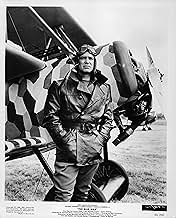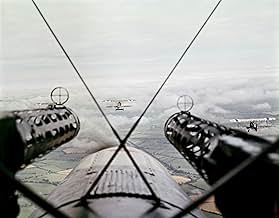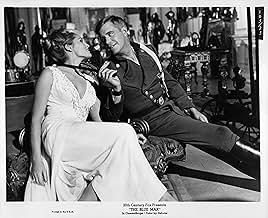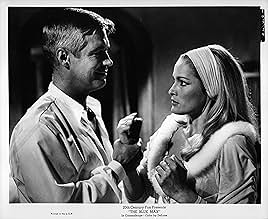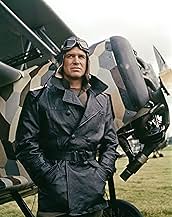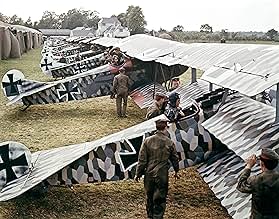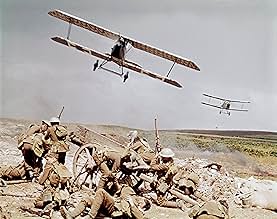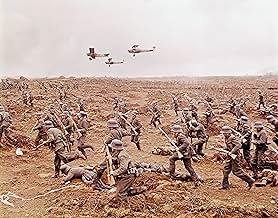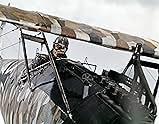Un joven piloto de las fuerzas aéreas alemanas de 1918, mal visto por ser de clase baja y poco caballeroso, intenta ambiciosamente ganar la medalla ofrecida por 20 bajas.Un joven piloto de las fuerzas aéreas alemanas de 1918, mal visto por ser de clase baja y poco caballeroso, intenta ambiciosamente ganar la medalla ofrecida por 20 bajas.Un joven piloto de las fuerzas aéreas alemanas de 1918, mal visto por ser de clase baja y poco caballeroso, intenta ambiciosamente ganar la medalla ofrecida por 20 bajas.
- Dirección
- Guionistas
- Elenco
- Ganó 1 premio BAFTA
- 1 premio ganado y 5 nominaciones en total
- Elfi Heidemann
- (as Loni Von Friedl)
- Feldmarschall von Lenndorf
- (as Friedrich Ledebur)
Opiniones destacadas
Unmistakably one of the most entertaining war films to come out of the 1960s, "The Blue Max" is the kind of film that could only have been made in Hollywood. Featuring some of the best aerial combat scenes ever shot and a great ensemble cast, it's enjoyable pulp fantasy for any war film fan.
The film opens with a brilliant, intense action sequence: Bruno Stachel (George Peppard, "Tobruk") dives into a mud-filled crater on the Western Front. He's visibly exhausted; his heavy breathing and unshaven face reveal how horrible front line conditions are. From above comes the sound of a dogfight Peppard's bright blue eyes blare from a mud-covered face as he stares in awe at the action in the skies above him, the mood fully established with Jerry Goldsmith's evocative score. Flash forward two years: Stachel has transferred to the Luftwaffe and is a green, inexperienced pilot. A peasant, Stachel has little in common with his high-class comrades, members of the elite Officer Corps. He's ruthless and ambitious, and sets his sight on winning a Blue Max the medal awarded to a pilot with 20 kills to his credit. With this award, Bruno will have won the respect of his comrades. Squadron commander Heidemann (Karl Michael Vogler, "Patton") has one, and hotshot Willi von Klugermann (Jeremy Kemp, "Operation Crossbow") is awarded one early in the film. Stachel vigorously has to catch up to their status, and Willi takes a liking to him, helping him try to fit in.
As Germany is losing the war, Willi's uncle, General von Klugermann (James Mason, "Cross of Iron") enters the stage: he sees potential in Stachel for more than just flying prowess. This is a time when the common people of Germany need a hero. Stachel is a poor farm boy, someone they can all relate to. Von Klugermann sets out to make Stachel a national icon; when he received a minor wound, he's escorted to a cushy Berlin hotel and the press takes pictures of a nurse tending to his wound, plastering pictures all over the national newspapers. Countess Kaeti von Klugermann (the beautiful Ursula Andress) sets her sights on Stachel, and soon a steamy affair has begun, right under the nose of the General. As Stachel's selfish ambitions become more apparent and blatant, Willi's friendly competitiveness fades and their adversity becomes an all-out battle. All of this builds to an unavoidable, somewhat depressing ending.
This is a character-driven drama firstly, and the action is simply a supplement to the story of the characters. Unfortunately, Peppard is a wooden lead. He speaks in unaccented English and never seems to be thoroughly involved in his part; it's as though he's sleepwalking through almost every scene. The rest of the cast deserves more credit. Co-star Jeremy Kemp is much more believable. He's sly, cynical and delivers fantastic deadpan humor. James Mason is brilliant as usual as General von Klugermann, a career German officer whose chief concern is for the German people and his nation's prestige. I have never seen Mason deliver a bad performance, and here he is simply fantastic. He's often cool and restrained, but lets anger and rage come out full-force at key moments. As his unfaithful wife, Ursula Andress is her typical self; beautiful and often barely concealed. A standout is Karl Michael Vogler as Heidemann. A veteran flyer devoted to his duty, Heidemann is a career soldier. He's been fighting since the beginning of the war, and although weary and tired, keeps doing his job. His chief goals are keeping as many planes flying as possible, despite Allied air attacks and supply shortages. He demands that Stachel's ambitions take second fiddle to strategic operations; when he disobeys orders, Heidemann threatens to have him court-martialed. Vogler's performance is excellent, and he walks away with each of his scenes.
Director John Guillermin and Director-of-Photography Douglas Slocombe weave some excellent flying sequences into the film's story. These action scenes are not independent conflicts between German and English fighters conflicts between characters are developed on the ground and either expanded or settled in the air. The skies have never been bluer, and the vintage aircraft look fantastic as they dive, swoop and strafe enemy columns. The stunt work and special effects are genuine, even some brilliantly-staged crash sequences. Even the work of Guy Hamilton and crew in 1969's "Battle of Britain" pales in comparison to this. The scenes of trench warfare and bombing runs are massive and spectacular. The mud-splattered soldiers, vast fields dotted with rotting corpses and bomb craters, and some hand-to-hand combat has never looked more authentic. Every cent invested in the film was put to good use. Scenes in Berlin particularly that in the hospital and food riots shot through a moving car window are historically accurate.
Guillermin isn't afraid to experiment with the camera during the discussion scenes. Note how he often places two actors in one room on opposite ends of the frame, simply to capture the scope of the interiors. Marvelous pans show off huge numbers of extras and planes taking off and landing. There's also a long crane shot showing a huge, lavish dining hall at the Von Klugermann's mansion which captures the essence of nobility and aristocracy in one shot.
"The Blue Max" is a brilliantly shot, engaging and wildly entertaining World War I epic which should satisfy any fan of aircraft and war films. This is a must-see DVD, which preserves the CinemaScope ratio (a necessary asset, as pan-and-scan versions detract from the epic look of the picture) and also features a great restored surround-sound track and stunning digital image quality. It's the only acceptable way to see this film in the modern world.
Overall, Blue Max has moments of greatness and moments of boredom. A must see for war film fans, in any case.
I first saw this on television in the early 1970s and was impressed with it then . I'm still impressed with it now though with reservations . As several people have pointed out the story drags when the story switches to the adultrous affair between Bruno Stachel and his Baroness lover . It should also be pointed out that George Peppard and Ursula Andress are rather unconvincing in these scenes and seem to be playing characters in a romantic drama set in the 1960s than in the early part of the century . I hated these scenes when I first saw the film and I hate them thirty years later . I also can't help thinking this sub plot makes the movie slightly over long . Was it included to make the movie more marketable to a female audience ? If a movie features thousands of men sticking bayonets into each other no woman will be going to the cinema to watch the movie full stop
That's my only real criticism though there are one or two other flaws regarding historical facts and planes used , but lets look at the positive points . This the best film I've seen featuring First World War dogfights , when you see a movie like ACES HIGH etc it's painfully obvious that actors are sitting in front of some back projection but with the exception of one rather poor scene you can believe the cast are indeed flying their own planes , the arial battles are superb as are the battles on the ground
The cast play up to their characters in thinking they are 20th century knights fighting in an honourable and elitist way and though they're the other side it's impossible to hate them in anyway , and it's interesting to see James Mason playing a morally upstanding army officer in a role almost identical to the one he played in CROSS OF IRON . I guess it doesn't matter whose side your on because politics will win out in the end
Since the release of "Flyboys" it seems amazing that a movie made forty years ago has a more polished, advanced, and contemporary look than one made today. This will amaze people who compare films of the twentieth century one hundred years from now."The Blue Max" has better cinematography, special effects, acting, storyline, etc. In the end its a disappointing fact that today's films have taken giant steps backwards compared to those of the '60s.
The flying sequences and scenes of aerial combat in "The Blue Max" have never been surpassed or equaled. Even in "Flyboys" with millions of dollars of CGI effects no movie has ever captured the feel of flying and aerial fighting like this one. The planes all look authentic, too.
The big scope of World War One does not swallow up the intense personal stories here either. This is one of the only films that explores the psyche of successful fighting men. The arrogance they need to maintain their bravery and aggression can also be their downfall. Here we also can see the politics behind the combat, both on a personal and national level. This is a very thrilling history lesson.
The actors are so good, and the characters so complex I forgot they were supposed to be my (supposed) enemy. Peppard does a good job of acting, playing a guy who is meant to be both likable, admirable, irritating and repulsive at the same time. The only problem is he looks too American for the role. Imagine if Brando had done it, but he had a hard time choosing really good parts. My favorite is James Mason, who played German generals better than they could play themselves off-screen. If you like flying, history, or personal drama you can't miss this one.
The image is sharp and the colors are vivid. The sound is a bit conventional, but since the story is all-encompassing and well developed you will probably forget all technicalities and just sit through an excellent movie as I did.
The story deals with a simple German infantry soldier, stuck in the horror of the trench warfare, who dreams to fly and become an ace.
Well, he doesn't have to wait long and soon he's a flyer. he also becomes an ace.
Unfortunately, his modest social origins, keep him from the Sun, the Blue Max in fact. The Blue Max is the highest ranking medal given to pilots in WWI.
Knowing that, Stachel (Peppard) decides to fight all the odds and becomes totally ruthless and opportunistic.
Unluckily for him, two can play at the same game. The German Reich needs a hero, an example to play its cards right, in order to have more draftees to send to the front.
Stachel becomes such a hero, but to a price...
It is a crude and cruel depiction of the rise and fall of someone who came from nothing and through war, thought he could make it in society, only to find out that certain games are better left alone.
A very good morals and ethics lesson, from which many people could still learn something.
I can only suggest it. The rest is up to you.
¿Sabías que…?
- TriviaFox wasn't able to rent any of he surviving WWI planes still extant, so they built their own. The aircraft were later used in "Darling Lily" and "You Can't Win Them All."
- ErroresThe German award called the "Pour le Mérite" (a.k.a. the Blue Max) was awarded at the beginning of the war to pilots who shot down 8 enemy aircraft; that was later raised to 16. The requirement was never 20 as depicted here.
- Citas
Willi von Klugermann: By the way, Stachel... there's an impression around that... you care more about your unconfirmed kill than you do about Fabian's death.
[long pause]
Bruno Stachel: Perhaps it's force of habit. In the trenches, we couldn't even bury the dead; there were too many of them. I've never had the time... to discuss them over a glass of champagne.
- Versiones alternativasIt is believed that this film was at one time released in a 70 mm version (because of its six channel soundtrack), but this has never been confirmed.
- ConexionesFeatured in The Amazing Howard Hughes (1977)
- Bandas sonorasDeutschlandlied
(uncredited)
Music by Joseph Haydn
Lyrics by August Heinrich Hoffman von Fallersleben
Played at Stachel's medal presentation
Selecciones populares
- How long is The Blue Max?Con tecnología de Alexa
Detalles
Taquilla
- Presupuesto
- USD 5,000,000 (estimado)
- Tiempo de ejecución2 horas 36 minutos
- Color
- Mezcla de sonido
- Relación de aspecto
- 2.35 : 1
Contribuir a esta página



